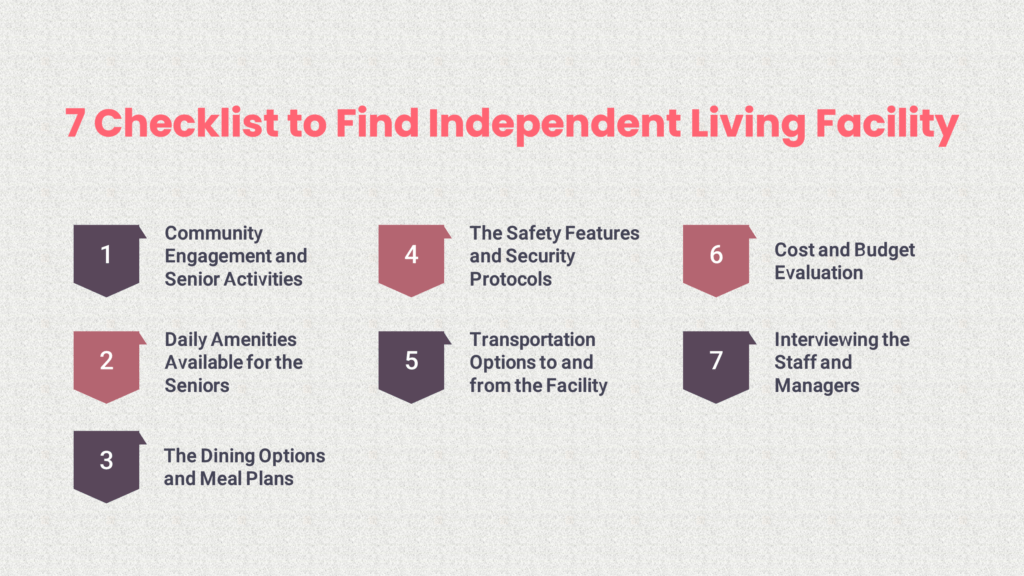Introduction
Choosing to live in an independent living community is a big step in life. However, it takes effort and research to find the right senior independent living facilities. So, where should seniors and their family members begin?
The amenities and services available to independent living residents vary greatly. Most senior living communities provide a wide range of activities, nutritious meals, housekeeping, and transportation. Yet, each independent living community has its own characteristics, staff, and cost.
Thus, there are a lot of things to consider when choosing independent living facilities for seniors. There are “must-have”, “would like to have”, “should have”, and other choices to look into. An independent living checklist will surely be of great help to you.
What Is an Independent Living Facility?
Independent living for the elderly was first initiated as a disability movement back in the 1960s and 1970s. The movement was instigated with a simple philosophy where seniors with physical limitations would come together and form a community. They will share the community and live privately with social engagement and as much independence as possible. If they require assistance with Activities of Daily Living (ADLs), that will be structured too.
Today, independent living is also widely popular in retirement communities. Retirees live in independent living facilities with the freedom to sustain a social life with like-minded seniors. These facilities also provide services like meal preparation, housekeeping, transportation, medication management, and many more if required.
Check if Independent Senior Living is right for you
Independent living has been one of the most popular senior care trends in recent years. Moving from a big home to an independent living community can be both challenging and thrilling. However, the true struggle is determining whether you actually need it.
1. Are you healthy with minor health concerns?
Someone who hasn’t had any major health problems or isn’t managing a chronic ailment is the best prospect for independent living. Still, something bothers them or their loved ones. Independent living can be quite beneficial for elders who live in old buildings that are not constructed for seniors with mobility issues.
2. Do you need help with some regular tasks?
Independent living is a terrific choice for seniors who do not require round-the-clock nursing care but may require some assistance around the house. Independent living, while not as rigorous as assisted living, which assists older persons with functions such as cooking and bathing, can take care of ordinary household chores that may cause problems for the elderly, such as housekeeping, laundry, and cleaning.
3. Are you struggling to maintain a whole house on your own?
There’s no doubting that having a home presents several difficulties. Still, one of the most significant is keeping up with maintenance, which may be particularly difficult for seniors with mobility issues. Seniors can, however, ensure that any necessary maintenance is handled by transitioning to independent living.
4. Do you feel socially isolated and want to be a part of a senior community?
It’s common for seniors to feel isolated and lonely as they get older. This can be whether as a result of the loss of a spouse or friends moving away after retirement. This increases their risk of acquiring health problems and depression symptoms. Fortunately, one of the most essential advantages of independent living is that it allows elders to become more social.
8 Things to Look for When Choosing the Right Independent Living Facility
How can you identify which senior independent living facility is appropriate for you? Here’s a checklist to help you get started. Find out what to look for when visiting independent living facilities while researching online and what questions to ask about independent living facilities over the phone.
1. Community engagement options and senior activities
Older adults in independent living do not require much medical care. As a result, this type of community is a way to enhance your quality of life. You will need a better social life with community engagement and daily living activities.
As a result, you’ll want to be sure that the independent living community you choose offers a variety of social activities.
Do they provide a variety of services? How many activities does the facility provide for its residents? Ask yourself if you’re naturally social or if you need additional encouragement to meet new acquaintances. The answer can assist you in determining which neighborhood is the greatest fit for you.
Here are some more queries you can make from your end:
- Do the activities appear enjoyable, engaging, or relevant to your interests?
- Are you able to participate in activities with friends and family?
- Is the activities director considerate of the preferences of individual residents?
- Do the activities vary from week to week?
- Are there any events planned by the inhabitants, and if so, might you assist?
- Do you want to join any committees, clubs, or religious organizations?
2. Daily amenities available in the community
Another important aspect of independent living is that it relieves you of a variety of daily concerns and tensions. Costly bills such as yard maintenance, water, electric, and trash services are among the most typical.
Some other standard amenities can be:
- Library
- Nail salon
- Indoor or outdoor garden
- Lap pool or hot tub
- Fitness center
- Computer room
- Barbershop
- Entertainment room to socialize
3. The dining options in the community
Most independent living homes serve 3 home-cooked meals per day. You can also get snacks and beverages. To understand more about dining facilities, you can ask for a sample menu and ask the following questions:
- Do the staff ensure individual dietary plans?
- Is there diabetic-friendly diet food available?
- Will you get access to a dietician or nutritionist?
- How are the meals served?
- Can you cook your own meal if you want to?
- Do you get access to different appliances for cooking?
- Do you have vegan or vegetarian options?
- Can you invite family or friends over for meals?
4. Check out the safety features
Even though independent living communities do not typically provide medication management, they should take action to reduce falls and accidents. Standard features include emergency buttons or pull cords, grab bars in restrooms, and walk-in showers. You might also find fall detection systems or motion sensors in some communities.
During your tour, inquire the following as well:
- Features available to prevent falls in seniors
- Emergency alert systems
- Evacuation plans during natural disasters
- On-site staff availability during emergency
- Central security systems to eliminate break-ins and thefts

5. Investigate the transportation options in the facilities
As a senior living independently, you might want to drive your own car. And others might wish to save the maintenance and fuel costs and use community transport facilities. Thus, check out the transportation options included in the independent living community for best mobility.
You can consider asking the following questions:
- Can you keep your own car in the community?
- Do the communities provide personal parking spaces?
- What are the costs associated with private parking?
- What kind of parking options do you get?
- Will the community offer nursing home or hospital transportations?
- Are there regular short or long trips available for the residents?
6. Evaluate the costs and your budget
Three major factors determine the expenses of independent living:
- The location
- room size
- Services offered
The average monthly cost of independent living is between $1500 to $6000. The costs depend on multiple factors such as the independent facility location, amenities offered, and the care and assistance required by the seniors. For example, buying condos can cost as much as a million dollars and luxury apartments about $100,000. In comparison, a low-income residence might cost about $1000 per month.
Some queries you can make before finding independent living facility:
- What is the exact price of the facility?
- What amenities are included in the final cost?
- How long can you sign the lease? Will the price change with time?
- What are the things that will cost extra?
- What are the payment options?
- Are there any special deals or discounts available for senior residents?
- What kind of renter’s insurance is available for you?
7. Talk with the staff and managers
Make time to talk with the managers and staff directly during your visit. After all, you will need to engage with them on a daily basis. Also, it’s essential to get an idea of how staff and management collaborate.
You can consider asking the following questions in an interview session:
- How much is the manager involved in the life of the residents?
- What is the communication mode between the residents and the staff members?
- How does the community hire the staff members? Does the community-run a background check on the employees?
- How much time do the employees provide to know the residents personally?
8. Narrow your search by preferred area or community
Finally, you can narrow down your search through independent living facilities near you to make the decision-making process easier for you. For this, the best approach would be to find out as much information as possible on the city, location, or facility. Consider seeking answers to questions like:
- Good things about the community
- Convenience to the location from your family and friends
- The crime rate of the location
- Is the community a part of a local or national chain?
- Housing options, cost range, and meal plans of your listed communities
- What are the reviews of the location or community?
3 Ways to Know You Have Found the Right Independent Living
After moving to senior living, you can settle into a pleasant, rewarding, and leisure activity lifestyle with the ideal independent living community. But confusion may still arise even after your decision. So, here are 3 ways to be sure that you have found the right independent living.
1. Review the complete checklist
Can the independent living community accommodate the majority of your requirements? Have they met or exceeded your expectations in certain areas of your checklist? If so, you have chosen a proper independent living for yourself.
2. Have faith in your instincts
How do you feel in the neighborhood that you selected? Do you feel at ease, safe, and comfortable? If so, accept your initial impressions and dismiss anxious thoughts.
3. Continuously reach out to experts for better options
You may feel right with the communities you’ve seen. Or they might not meet your “must-have” criteria. If this is the situation, don’t give up without looking into other options.
Find More Resources about Independent Living from BoomersHub
- Types of Independent Living
- Resources for Independent Living
- How to Get into Independent Living on a Budget?
- How Much Does It Cost to Live in Independent Living?
- Independent Living vs Assisted Living
Conclusion
It can be difficult for a retiree to find an independent living facility. Make sure you’re not making a decision based on uncertainty or ambiguity. Keep in mind that you’ll need to stay in better shape for the rest of your life. As a result, the independent living community must be excellent and meet your needs and your budget.
Selecting a senior independent living home does not have to be stressful or intimidating if you have a clear idea of what questions to ask. We want you to locate a place to improve your quality of life while also providing you with the community and support you require.

